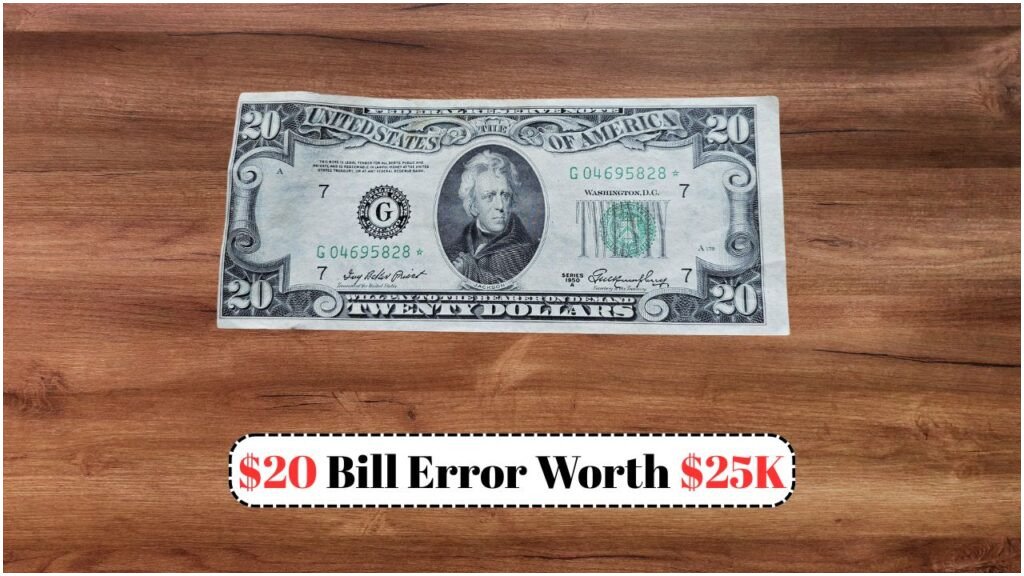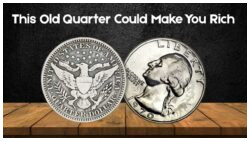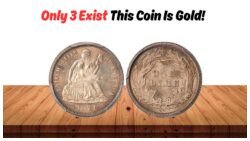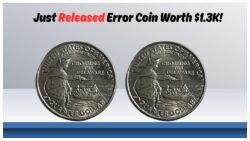$20 Bill – In the world of currency collection, a small printing mistake can lead to a massive windfall. That’s exactly what’s happening with a rare $20 bill that features a unique printing error — and collectors are now willing to pay up to $25,000 for it. Surprisingly, despite its rare defect, the bill is still considered legal tender and can technically be used for everyday purchases. But anyone lucky enough to own this misprinted bill might think twice before spending it like regular cash. In this article, we’ll explain what makes this $20 bill so special, how to identify one, why it’s worth so much, and how you can potentially find one in your wallet or at the bank.
What Makes This $20 Bill So Valuable?
While millions of $20 bills are printed and circulated each year, only a small fraction have errors. And even fewer of these misprints make it out of the printing facility and into the hands of the public. Here’s why this particular bill is so valuable:
- Rare printing mistake: The misprint includes a misalignment of serial numbers or seal placements.
- Low circulation: Very few of these error bills exist in public hands.
- Collector demand: Currency collectors, also known as numismatists, highly prize error notes.
- Still usable: Even with the error, the bill is legal and can be spent — making it a curiosity.
Common Features of the $20 Error Bill
If you’re wondering whether you might be holding a small fortune, here are some of the most common error types found on the high-value $20 bill:
| Feature | Description |
|---|---|
| Misaligned Serial Numbers | Numbers do not line up properly on both sides of the bill |
| Double Printing | Duplicate images or numbers appear due to printing missteps |
| Ink Smears or Bleeds | Ink blotches or color runs disrupting the usual print pattern |
| Fold Over Errors | Part of the bill was folded during printing |
| Seal Misplacement | Federal Reserve or Treasury seal appears in the wrong spot |
| Missing Elements | One side of the bill lacks important design elements |
| Off-Center Prints | Entire print design is shifted away from center |
How Did These Error Bills Make It into Circulation?
The U.S. Bureau of Engraving and Printing follows strict quality control, but occasionally mistakes slip through. In the case of these $20 bills:
- The error occurred during the third print pass, where serial numbers and seals are applied.
- Some sheets were not aligned correctly, resulting in off-center or double prints.
- A small batch escaped inspection and was released into public circulation.
These kinds of errors are extremely rare, making each surviving bill a treasure for collectors.
Where Can You Find One of These Bills?
You might be surprised to learn that such bills can be found in the most unexpected places:
- From ATMs: Some collectors have reported receiving error bills directly from bank machines.
- At banks: New bundles from the Federal Reserve can occasionally contain flawed notes.
- In circulation: Look closely at your change — that “weird-looking” bill could be worth thousands.
Don’t overlook old bills in your drawer. That $20 you’ve been ignoring might just fund your next vacation!
Recent Auction Sales and Collector Demand
The buzz around these misprinted $20 bills has grown after several high-profile auctions. Here are some real-world examples:
| Auction Date | Condition | Error Type | Sold Price |
|---|---|---|---|
| Jan 2024 | Uncirculated | Double Print | $25,300 |
| Nov 2023 | Circulated | Misaligned Serial | $17,800 |
| Aug 2023 | Uncirculated | Seal Misplacement | $19,500 |
| May 2023 | Circulated | Ink Bleed | $14,200 |
| Feb 2022 | Uncirculated | Fold Over Error | $22,000 |
As more collectors enter the market and the supply of error bills remains low, prices are expected to rise even further.
How to Get Your Bill Authenticated
If you believe you own a rare $20 bill with a misprint, here’s what you should do:
- Do not try to clean or flatten it — this can reduce its value.
- Place it in a protective currency sleeve to prevent damage.
- Take clear, high-resolution photos of both sides.
- Contact a reputable currency grading service such as PMG (Paper Money Guaranty) or PCGS Currency.
- Avoid quick online sales — get a proper appraisal first.
Authentication is key to proving your bill’s worth and ensuring you don’t get lowballed in private sales or auctions.
Is It Better to Sell or Hold?
This decision depends on your goals:
- Sell now if you need quick cash — the demand is high and prices are strong.
- Hold if you’re willing to wait — prices may climb further as these bills become even rarer.
Just like rare coins and stamps, error currency often increases in value over time.
In a world where digital payments dominate, physical cash may seem mundane — but every once in a while, a small error turns a simple $20 bill into a $25,000 jackpot. These rare bills are legal tender, but their real value lies in their rareness, uniqueness, and demand among collectors. So, next time you get change, don’t just shove it into your pocket — take a closer look. That “flawed” note might just be your lucky ticket.
FAQs
Q1: Are error $20 bills really worth $25,000?
Yes, depending on the rarity and type of printing error, some bills have fetched up to $25,000 at auctions.
Q2: Can I use an error bill at a store?
Yes, it is still legal tender — but spending it would be like throwing away thousands.
Q3: How can I check if my $20 bill has a printing error?
Look for misaligned serial numbers, off-center prints, missing seals, or duplicate markings.
Q4: Where can I sell an error $20 bill?
You can sell it via currency auction sites, eBay (with caution), or contact a professional numismatist.
Q5: Is it safe to keep these bills at home?
It’s best to store them in protective sleeves and possibly a fireproof safe until they are sold or graded.





